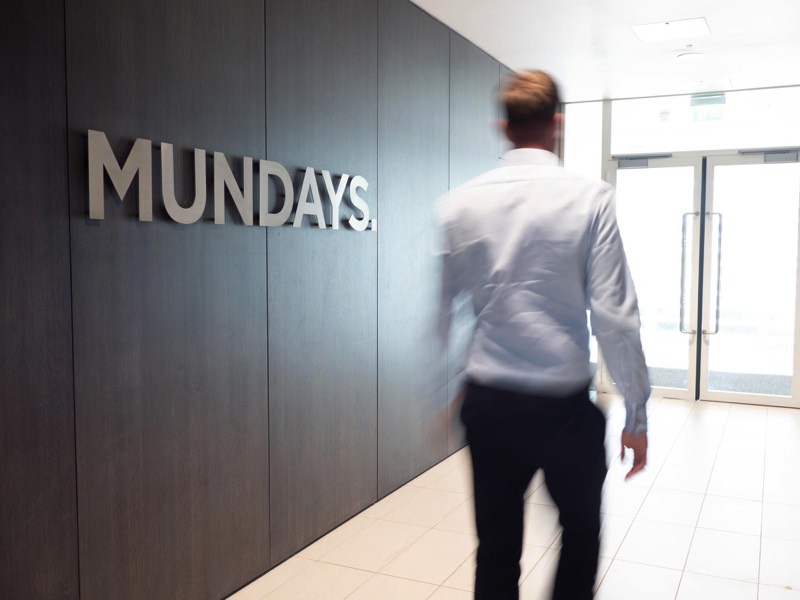LEGAL
Surrey’s Premier Lifestyle Magazine
Successfully exiting your business
Thomas Connor of Mundays solicitors gives an overview of the key considerations in preparing your business for sale and the legal sale process.

There are many ups and downs in running and owning your own business. Inevitably a time will come during the life of your business when the moment is right for you to step away and in doing so, capitalise on all those years of hard work. There are numerous factors which determine how smooth the exit process is and unfortunately no business owner can prepare for every eventuality. However, our experience has shown us that an owner who has focussed on exit strategy preparations well in advance of their exit will find that they are far better equipped to deal with the stresses and strains of the exit process and any issues that arise.
An exit may include a flotation – when a previously unlisted company offers its shares for sale to the public leading to a stock market listing. There may also be a management team wishing to step into the footsteps of the current owners or willing family members to take over. This article focuses on trade sales as the exit route but, no matter how the exit is structured, planning is key. Often the process comes with as many questions as it does tasks. Preparing for a sale will keep you busy and for most business owners this must be done in addition to keeping the business running. Therefore, it is worthwhile starting as early as possible. A well-managed business with no ‘skeletons in the closet’ will ease the sale process.
Ways to exit
There is more than one way to sell your business. If your business is a limited company, you have the choice of selling the shares you own (known as a share or company sale); or simply selling the business and assets as a going concern (known as an asset or business sale). The method you choose may depend on whether you are selling the whole business or just a specific part. Very often, parties will opt for the most tax-efficient method. This usually means a share sale, but it is best to engage with accountants and tax advisers at the outset.
Valuation
What is my business worth? This is a question that you will have asked yourself over and over again. If you have not already done so, it may be worth getting a professional valuation done so that you have an idea as to the likely price that can be achieved. It is sensible to obtain two or three valuations, even if they are only desktop valuations. It is also worth noting that business valuations are only snapshots in time, so it is likely they change over time due to both internal and external factors.
An exit may include a flotation – when a previously unlisted company offers its shares for sale to the public leading to a stock market listing. There may also be a management team wishing to step into the footsteps of the current owners or willing family members to take over. This article focuses on trade sales as the exit route but, no matter how the exit is structured, planning is key. Often the process comes with as many questions as it does tasks. Preparing for a sale will keep you busy and for most business owners this must be done in addition to keeping the business running. Therefore, it is worthwhile starting as early as possible. A well-managed business with no ‘skeletons in the closet’ will ease the sale process.
BUSINESS PLANNING
Ways to exit
There is more than one way to sell your business. If your business is a limited company, you have the choice of selling the shares you own (known as a share or company sale); or simply selling the business and assets as a going concern (known as an asset or business sale). The method you choose may depend on whether you are selling the whole business or just a specific part. Very often, parties will opt for the most tax-efficient method. This usually means a share sale, but it is best to engage with accountants and tax advisers at the outset.
Valuation
What is my business worth? This is a question that you will have asked yourself over and over again. If you have not already done so, it may be worth getting a professional valuation done so that you have an idea as to the likely price that can be achieved. It is sensible to obtain two or three valuations, even if they are only desktop valuations. It is also worth noting that business valuations are only snapshots in time, so it is likely they change over time due to both internal and external factors.
10 stages to selling your business
Once you have done all the hard work in readying the business for sale, here is a brief summary of what you can expect as the sale process proper kicks in.1 Going to market – without a buyer there is no deal. It is key to find a buyer that will allow you to achieve your own objectives from the sale;
2 Instruct professionals – it is at this stage that it is most common to instruct your advisers in the deal, ranging from corporate solicitors to accountants and tax advisors. Hopefully you will have already engaged with them as part of your sell-side due diligence;
3 Heads of terms – once a buyer has been chosen, the basic framework of the deal is usually agreed between the parties; this may also include entering into an agreement regarding exclusivity and/or confidentiality;
4 Due-diligence – the buyer carries out their investigations into your business known as ‘due-diligence’. This requires you providing replies to the buyer’s due-diligence questionnaire, covering legal, operational, accounting, tax, employment and a variety of other areas;
5 Sale and purchase agreement – this is the key contractual document between yourself and the buyer. It sets out what, when and how you will be paid, any conditions to or deferment of the purchase price. It will also include warranties (statements about the business and operations) in favour of the buyer and possibly indemnities to address any known issues;
6 Disclosure letter – as a seller you have an opportunity at this stage to disclose anything which, if not disclosed, would constitute a breach of the warranties. Although the importance of this stage is sometimes overlooked, disclosure is vital to ensure you are properly protected;
7 Ancillary documentation – there is an array of documentation that needs to be prepared which accompany the main transaction document;
8 Completion – the transfer of ownership of your business will take place at this stage, the documents are dated and the purchase price (or at least the first part of it) is paid;
9 Post-completion tasks – this stage may involve anything from handing over the keys to introducing the buyer to key customers and suppliers, assisting with the business transition and finalising any monies you have agreed to accept after the completion date (deferred consideration);
10 Pop a cork! – the sale is complete and you have successfully exited! With appropriate and well negotiated limitations in the sale agreement, any ongoing potential liability can be capped to allow you to enjoy the fruits of your hard work.
Finding a buyer
There is always a buyer at the right price. However, what every business owner will need when they embark on an exit is to find a buyer at a price that allows them to maximise the return on the invested time and capital. Some sellers prefer a more public process, others use a broker to help reduce the risk of losing any clients or employees due to the possible negative connotations with putting a ‘for sale’ sign on your business. Different business owners will have different objectives in selecting a buyer. Some will give great importance to the ongoing continuation of the business, especially if it has been in the family for a while, others will be more concerned with the final price – understanding what you want from the deal is often half the equation.
Preparing the business for a sale
This step is what is sometimes referred to as sell-side or vendor due diligence. During the sale and purchase process the buyer will ask a raft of questions about all aspects of the business.
A huge time-saver in preparation for this will be carrying out an internal due diligence or audit process to identify any issues before the buyer’s magnifying glass sets eyes on them. This frequently means ensuring you have proper accessible records, properly written contracts and policies and your business is compliant with relevant rules and regulations and the business’ key assets are suitably protected, for example brand names are registered as trademarks. It goes without saying that any issue identified should, if possible, be rectified. This is a vital step as it not only makes the business more attractive to a prospective buyer, but it will also help to quicken the sale process and reduce the risk of the buyer seeking a price reduction as a result of issues coming to light during its due diligence. Remember, in the business world, no one likes surprises.
Selling a business will often mean cashing in on one of your most valuable personal assets. Well before your eventual exit is the right time to ensure that your personal affairs are in order. This includes any personal tax and inheritance planning. If you are selling due to ill-health, consider putting in place a property and financial affairs lasting power of attorney, which will permit someone to assist with the sale and manage the process on your behalf.
If at any point during your exit strategy planning you require some guidance or if you are about to embark on a sale, Mundays is here to help.
Mundays corporate team can advise you through a successful exit with thorough planning and structuring by working closely with you and your advisers to ensure that the relevant steps are taken to implement the proposed structure. We are able to anticipate issues with our wealth of experience to act fast with a valued and dedicated support team across the firm’s other disciplines to deliver tailored advice to you.
There is always a buyer at the right price. However, what every business owner will need when they embark on an exit is to find a buyer at a price that allows them to maximise the return on the invested time and capital. Some sellers prefer a more public process, others use a broker to help reduce the risk of losing any clients or employees due to the possible negative connotations with putting a ‘for sale’ sign on your business. Different business owners will have different objectives in selecting a buyer. Some will give great importance to the ongoing continuation of the business, especially if it has been in the family for a while, others will be more concerned with the final price – understanding what you want from the deal is often half the equation.
Preparing the business for a sale
This step is what is sometimes referred to as sell-side or vendor due diligence. During the sale and purchase process the buyer will ask a raft of questions about all aspects of the business.
A huge time-saver in preparation for this will be carrying out an internal due diligence or audit process to identify any issues before the buyer’s magnifying glass sets eyes on them. This frequently means ensuring you have proper accessible records, properly written contracts and policies and your business is compliant with relevant rules and regulations and the business’ key assets are suitably protected, for example brand names are registered as trademarks. It goes without saying that any issue identified should, if possible, be rectified. This is a vital step as it not only makes the business more attractive to a prospective buyer, but it will also help to quicken the sale process and reduce the risk of the buyer seeking a price reduction as a result of issues coming to light during its due diligence. Remember, in the business world, no one likes surprises.
PERSONAL PLANNING
Selling a business will often mean cashing in on one of your most valuable personal assets. Well before your eventual exit is the right time to ensure that your personal affairs are in order. This includes any personal tax and inheritance planning. If you are selling due to ill-health, consider putting in place a property and financial affairs lasting power of attorney, which will permit someone to assist with the sale and manage the process on your behalf.
If at any point during your exit strategy planning you require some guidance or if you are about to embark on a sale, Mundays is here to help.
Mundays corporate team can advise you through a successful exit with thorough planning and structuring by working closely with you and your advisers to ensure that the relevant steps are taken to implement the proposed structure. We are able to anticipate issues with our wealth of experience to act fast with a valued and dedicated support team across the firm’s other disciplines to deliver tailored advice to you.
Thomas Connor
is a solicitor in the Mundays’ corporate and commercial team. He advises corporates and individuals across a broad range of sectors on corporate transactions with a particular focus on mergers and acquisitions, working with the wider Mundays’ teams to ensure a smooth running through the entire transaction.Thomas can be contacted on 01932 590585 or thomas.connor@mundays.co.uk.
essence info
Mundays LLP
400 Dashwood Lang Road, Weybridge, Surrey KT15 2HJ
Telephone: 01932 590612
Website: www.mundays.co.uk
The contents of this article are intended as guidance for readers. It can be no substitute for specific advice. Consequently we cannot accept responsibility for this information, errors or matters affected by subsequent changes in the law, or the content of any website referred to in this update. © Mundays LLP 2019.
Mundays LLP
400 Dashwood Lang Road, Weybridge, Surrey KT15 2HJ
Telephone: 01932 590612
Website: www.mundays.co.uk
The contents of this article are intended as guidance for readers. It can be no substitute for specific advice. Consequently we cannot accept responsibility for this information, errors or matters affected by subsequent changes in the law, or the content of any website referred to in this update. © Mundays LLP 2019.

